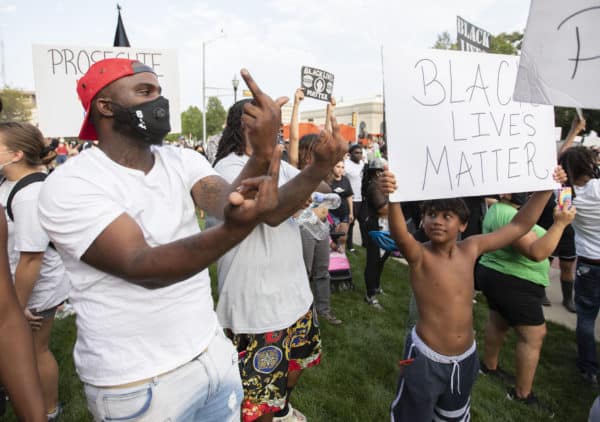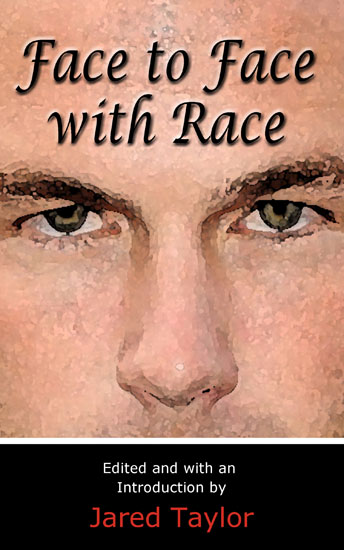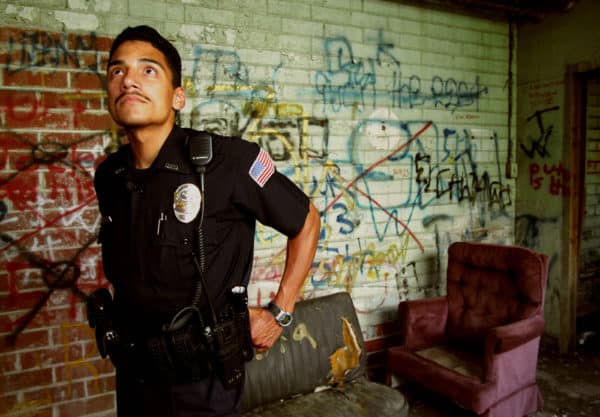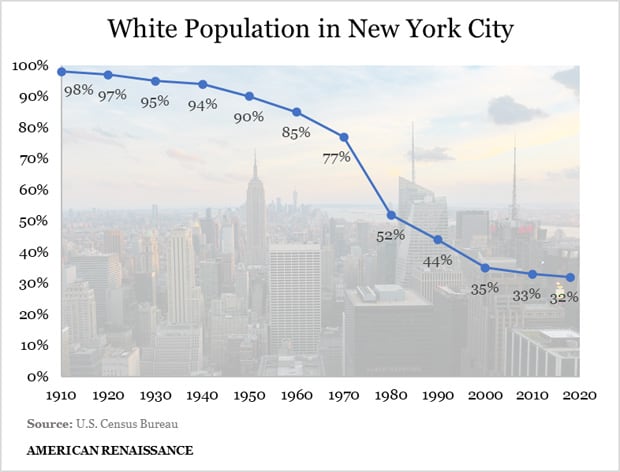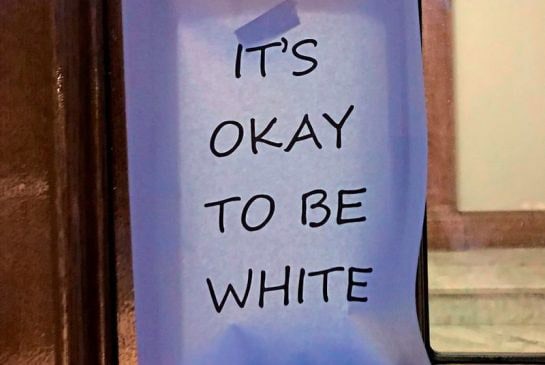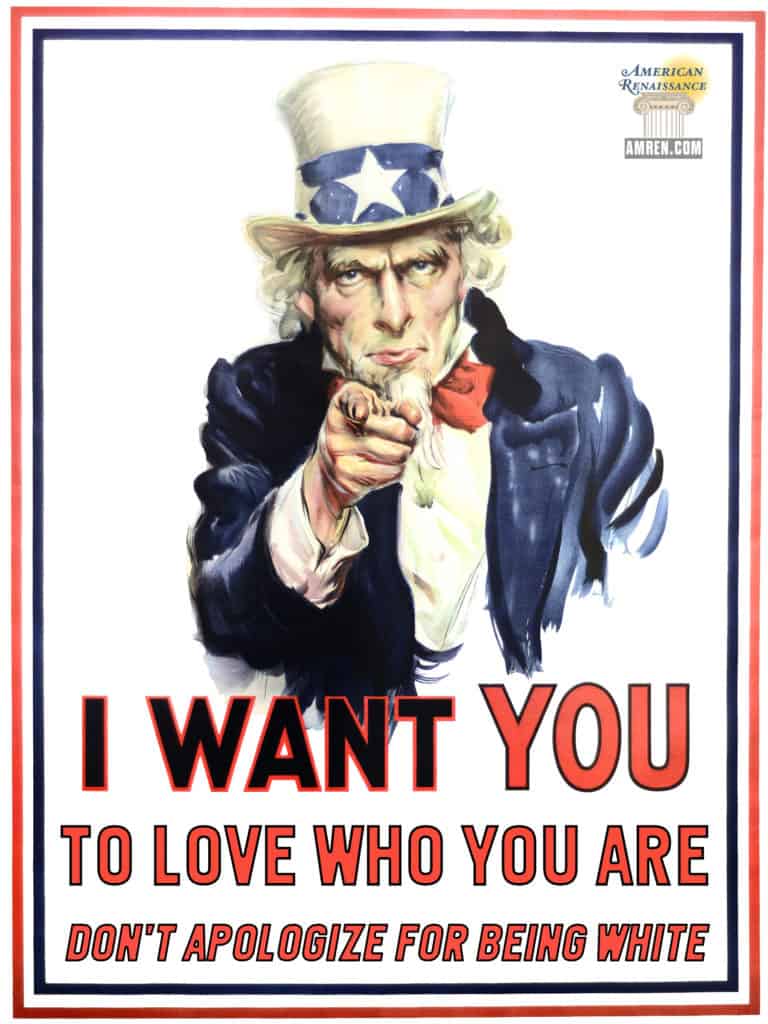What will it take for most white people to wake up
to the growing threat of dispossession in our homelands? It is a central
question facing our movement.
Notes from Chris Robert:
Every Saturday, American Renaissance publishes a brief essay by one of our readers about how he or she came to discover the reality — and importance — of race. In the essay below, Patrick McDermott examines what these stories have in common, and what they say about the future of white racial consciousness in America. I invite readers of The Unz Review to share their “red pill” stories as well. If you have one, please email it to me: roberts@amren.com
What will it take for most white people to wake up to the growing threat of dispossession in our homelands? It is a central question facing our movement.
Some answers to that question can be found in a series of first-person accounts written for American Renaissance (organized here by perspective and available here in book form). In a video inviting readers to submit their own personal stories, Jared Taylor asked, “How did you find the truth? How did you see the light?”
Dozens have responded to this call. Individually, each of these stories is deeply personal and valuable in its own way. Together, they reflect the sort of hard-won, collective wisdom that we need to help us understand how to wake up more whites to the threats we face.
Direct contact
Most of these authors wrote about how their initial views about race were optimistic, reflecting what they had been told by their parents or by institutions such as the media, schools, or their church. Over a decade ago, Mike Rienzi (a pseudonym, as are most of the authors mentioned here) told academic Robert S. Griffin about the stark difference between what we are told and the harsh realities we face:
People who think of themselves as enlightened and on the moral high ground in matters of race write off people like me as ignorant racists. Unlike them, so it goes, we pre-judge people. If only we were exposed to racial and ethnic diversity we would learn to value different kinds of people — et cetera, et cetera, you’ve heard the line.
You’ll notice that most of these people doing the pontificating and finger pointing about racial equality and harmony and the virtues of integration and multi-racialism do it from the far distance of the leafy suburbs or a university campus somewhere. The fact of the matter is that, unlike practically all of them, I have lived close up with the reality of race in America. And regardless of what they might like to think, I am not stupid or unenlightened or their moral inferior.
The people who look down their noses at people like me should come live for a year or two or three where my family and millions of other white families live. Let their children grow up and go to school in this pigsty and be threatened and attacked and robbed and raped. Then they can talk.
This view is still true today. “I don’t think I would ever have developed a racial consciousness if I had come of age in a ‘whiteopia’ — no matter how much Nietzsche I read in college — because my consciousness was born of direct experience,” wrote Hubert Collins.
Most of these personal accounts cite direct experience as playing the decisive role in their own awakening, sometimes in frightening terms. This is especially true among people whose jobs bring them face to face with non-whites every day: Police officers, teachers, and social workers.
A man gives the finger to police who were standing guard during a protest over the police shooting of Jacob Blake on Aug 24, 2020 in Kenosha, WI. (Credit Image: © Chris JuhnZUMA Wire)
“If you are an officer, you will quickly be ‘red-pilled’ on the reality of race, whether you like it or not,” wrote Officer Tom Andrews. “Race is part of practically everything an officer does, and the reality of racial differences becomes clearer the longer he does the job,” wrote retired Officer Ambrose Kane.
“Most whites simply do not know what black people are like in large numbers, and the first encounter can be a shock,” wrote Christopher Jackson, a teacher at a predominantly black high school in a Southeastern state. “Black-majority schools are much more violent than black-minority schools. Blacks, far more than any other race, are the most likely to attack both one another and school employees,” wrote Don Brandy, a special ed teacher who has taught all over the country.
Few whites take such jobs, but they are not the only victims. “The small number of whites who attend my school have it the worst,” wrote Jane Moss, a 20-year veteran teacher. “They get attacked, robbed, and verbally berated on a regular basis by their ‘peers.’ Many white students suffer from anxiety and self-esteem issues, leading to problems with drugs and self-harm.”
Several whites who attended majority non-white schools give similar, first-hand accounts. “I spent a total of four years in black schools, and during that time, I had a knife to my throat, witnessed a white student get his teeth knocked out, and was threatened almost every day,” wrote Eric Gustafson. Their neighborhoods are often no different. “My immediate family and I have been the victims of crime five times in my lifetime. Each time the perpetrators were black,” wrote Fiona Baker.
Women and girls are often special targets for abuse. “White girls have it worse than boys,” wrote A.J. Clinton about his school experience. “Every day, from the first bell to the last, they were bombarded by a never-ending wave of black boys groping, grabbing at, and catcalling them.” Sadly, the statistics on interracial rape suggest that things can get much worse.
“On the streets of Harlem, my blonde hair, blue eyes, and white skin made me an irresistible target,” wrote Tracy Abel, a social worker in New York. “The mothers called me ‘cracka ass’ and ‘white bitch’ while I labored on their behalf.”
Motherhood can provide its own awakening. Jane Moss noticed how having a white son changed her perspective. “It was only after he was born that I began to fully notice the relentless propaganda of the mainstream media, and how it promotes miscegenation and presents men like my son as bumbling, weak fools,” she wrote. “It was a realization that fully awoke the protective mothering instincts inside me.”
Most of the worst personal experiences involve blacks, but Hispanics are little better. “The worst thing about life in the barrio is the partying. Blacks hold base-thumping, rap-blaring, drug-fueled ragers. Hispanics squeeze 100 people onto one tiny property along with a mariachi band and a bouncy-house. Both types of party last all night long,” wrote Helen Doe, remembering her time living in Los Angeles.
“We were immediately struck by how dirty it was. My husband and I walked the neighborhood every evening for months picking up all the trash lining the streets. Right when we’d get a block looking decent, the trash would start to re-accumulate. We’d pick it up again — hoping to shame our ‘neighbors’ into better behavior — but that never happened.” This is unsurprising. Research has found that even in mixed-race neighborhoods, the interactions among neighbors of different races are infrequent and shallow.
Teaching in a majority Hispanic school was similarly discouraging for Eric Beck. “The students are generally lazy, abusive, and disrespectful,” he wrote. “Rather than do the work assigned, most of them spend their time texting, listening to music on their iPods, playing with cell phone cameras and handheld games, talking about sex and gangs and fighting, and eating junk food.”
Daniel Vinyard, a white cop who had policed such neighborhoods, wrote about what happens when these kids grow up. “Hispanics would prey upon any race of people for robberies, burglaries, thefts or other crimes for material gain — usually to buy drugs. As for violence, they mostly attacked other Hispanics, since shootings and stabbings were usually either gang or — strange as it may seem — family related.”
Atlanta, GA, — A police officer walks through a Hispanic gang hangout in an abandoned carpet dye plant. The gangs use the building as a drug marketplace. (Credit Image: Robin Rayne / ZUMAPRESS.com)
The Asian population is increasing faster than any other race in America. Experiences with the Asians are uncommon among these personal stories, probably because they are still relatively few in number and are not prone to violent crime. Still, this has not stopped white flight from neighborhoods transformed by Asian immigrants.
In one first-person account, an engineer who lived in California wrote about what it was like to compete with Asians for jobs after Silicon Valley began bringing them in to replace their white employees. “One of the interviewers was almost incomprehensible with his thick accent and poor English. I was thinking, ‘Why do I have to put up with this in my own country? Why is he the one with the power over me?’”
Time after time, these stories end the same way. Relief came only when the author moved. Steven Grant’s feelings are typical: “I want a white environment. When I go to a white area it is like a cloud lifts,” he wrote.
White flight has been well-covered in AR’s Great Replacement series, which has documented demographic change in cities such as New York, Chicago, and Baltimore. But white flight is not a permanent solution and it has its own adverse consequences.
“It saddens me to think that I can no longer live in the place where my mother lives and where I grew up,” wrote Denis Ruiz. “A neighborhood is where your friends are and where your kid goes to school and where you work — that’s what makes a neighborhood,” he said. “There is no neighborhood here at all for me now.”
Distant threats
Such experiences have awakened many whites, but if direct contact with other races is the only way whites will wake up, then we may face a tough road ahead. It is still easy for most whites to avoid these jobs, these neighborhoods, and these schools.
“It’s a safe bet that for many whites, exposure to blacks and Hispanics comes in controlled doses,” wrote John Ingram. “Their positive attitudes toward ‘diversity’ are shaped by isolated experiences with small handfuls of non-whites, often in majority-white settings.”
“My awakening did not come from one or even a few incidents, but from the accumulation of thousands upon thousands of small interactions,” wrote Donald Williamson. Is that what it takes?
Comments like these speak to a defining dilemma for whites, one that pits two strong hereditary impulses against each other. One impulse is the desire to be moral. Research has shown that this desire is heavily rooted in biology and evolution. Several thinkers on the Dissident Right, such as Kevin MacDonald, have suggested that this morality has evolved differently for whites — acting as a source of evolutionary strength in earlier times (producing high-trust societies that were more cooperative), but becoming an easily-exploited weakness today.
The opposing impulse is ethnocentrism — the natural desire among all peoples to affiliate with and protect their immediate family and extended kin. Such desires are fundamentally instinctual, found in both animals and humans, including babies. Scholars frequently cite genetics as the explanation for reciprocal altruism among closely-related kin and aversion and distrust toward outsiders.
For whites without much natural ethnocentrism, what can still make them racially aware is the presence of a threat. The importance of “threat” is apparent in the many personal accounts shared with American Renaissance. Again and again, these men and women write about how they started out idealistic. They adopted values taught to them by their parents and by society, including egalitarian notions of treating everyone the same regardless of race. Their views changed only after they experienced the reality of race up close. Faced with threats to their basic safety and well-being — not just to themselves, but also their families and especially their children — these whites changed. Survival instinct took over. They awakened.
But most whites have not suffered these experiences. Most live a safe distance away — in the suburbs, in gated communities, in high-rise apartments, or in one of the many communities or states where whites are still a majority. As I outlined in an earlier article, “How White Liberals Will Wake Up“:
Most white liberals will not be convinced by rational arguments, no matter how strong or well-supported those arguments may be. They will only be convinced by threats to their basic safety. This, in turn, points to the real barrier. Most white liberals do not feel threatened.
It seems that just enough social distance, combined with a deceptive media that covers up racial conflict when whites are the victims, has managed to keep most whites in the dark. At least one writer for American Renaissance thinks that under these conditions white people are good at just ignoring the problem. “People refuse even to think about it,” he said.
But that might be changing.
Future historians will probably look back at the present era and focus on one centrally important development that changed the trajectory of our history: the Great Awokening. The Great Awokening was the product of a several events that occurred from 2013–2014: the founding of Black Lives Matter, the decades-long development and dissemination of Critical Race Theory in academia which seemed to reach a tipping point at about the same time as the unrest in Ferguson, a media populated by left-wing journalists who had been trained in these schools and were fanning the flames of racial unrest, and an audience of college-educated white liberals that seemed primed for a leftist quasi-religious awakening.
The results were explosive. Today the effects of this ideology can be seen in the news media, Hollywood, television programs, commercials, sports, video games, and even comic books. Woke platitudes crossed the lips of numerous presidential candidates in the 2020 Democrat primaries. BLM helped spawn hundreds of riots and protests involving millions of people in the aftermath of George Floyd’s death. Unlike the effects of diversity, which can be sidestepped by retreating to the relative safety of a white suburb, the Great Awokening is unavoidable.
June 3, 2020, Orlando, FL: A protester chants slogans outside the Orlando Police Headquarters. (Credit Image: © Paul Hennessy / SOPA Images via ZUMA Wire)
BLM and the Great Awokening appear in several first-person accounts. “Black Lives Matter does a more effective recruitment job for race-realism than American Renaissance,” wrote Ambrose Kane, a police veteran. “Liberal whites are alarmed when their ‘pets’ turn on them. Many whites imagine that blacks are color-blind, whereas blacks see everything in terms of race.” “Almost every white advocate I’ve met who joined after 2014 says it was the Trayvon Martin or Michael Brown case that ‘woke him up,’” commented AR staff writer Gregory Hood.
But the effects have gone well beyond the protests. Academia, where much of this originated, has played an important role in waking up many young whites who can see through its indoctrination. “I had been brainwashed in college to think that everybody is basically equal,” said Carolyn Davies. “Your parents mortgage the farm to send you off to college to learn from these people, and so you assume the professors know what they are talking about and that they are telling you the truth, which I eventually found out they weren’t.” “It took years in academia to push me over the edge,” wrote Sinclair Jenkins:
I saw impressionable white girls constantly crying about imperialism and ‘white privilege.’ I felt my guts churn as a series of Southern women moved above the Mason-Dixon Line and immediately began telling all of their Northern and Midwestern professors how racist, sexist, and evil their home states are. Many of these women made fun of their parents for being realistic about the races.
This same indoctrination is becoming increasingly common in K-12 schools. In one personal account, a high school student wrote about the severe consequences of pushing back against a teacher who told him to acknowledge his white privilege. “One day during recess one of my peers physically attacked me while screaming ‘Nazi! Nazi!’ Another kid tripped me, and then my first assailant started kicking me while I was down. The school nurse didn’t do much, and my mother ended up taking me to the hospital later on.”
Workplace diversity trainings have subjected adults to this same indoctrination for years, but this too seems to be getting worse. “The setup reminded me of military boot camp, in which a drill instructor parades back and forth before the recruits to indoctrinate them in the ways of the military,” wrote Clement Astor. “At the end of the first day of this treatment I was angry. The class was not a dialogue, but a diatribe.”
Even some churches are going woke. “The clergy in my 85 percent white church bully the congregation with cries of racism, replacing the theology of original sin with Leftist guilt mongering,” wrote Ed Gee. “So as not to be disruptive with my unfashionable opinions, I avoid the ‘shame and blame’ events they have called, ‘Facing Racism.’”
These are not unusual reactions. Studies have shown that forcing whites to ponder their white privilege usually backfires, causing them to express more racial resentment rather than less. A Harvard Business Review overview of corporate diversity programs found that whites “often respond to compulsory courses with anger and resistance — and many participants actually report more animosity toward other groups afterward.” Other studies have found that when whites are reminded of their pending minority status, they respond by becoming more conservative, closer to other whites, and resentful of racial minorities.
Taken together, all of these trends — both localized and national — have subjected white Americans to a demographic, cultural, and ideological onslaught. And it has not gone unnoticed. Proof can be found in the many studies confirming that the two major political parties are now in the midst of a major realignment, with the primary dividing line centered squarely on race and racial views.
Under such circumstances politics becomes polarized and tribal: us versus them. “Scholars consistently find that incivility spreads rapidly, generates anger and defensive reactions, demobilizes moderates and activates the strongest partisans, corrodes faith in government, trust in institutions and respect for our fellow citizens,” wrote one academic observer in The Guardian.
“The more sorted we become, the more emotionally we react to normal political events,” wrote the University of Maryland’s Lilliana Mason. “The angrier the electorate, the less capable we are of finding common ground on policies, or even of treating our opponents like human beings.” Such language is not hyperbole. Research has shown that such extreme polarization is common before the outbreak of civil war.
With a new Democrat administration preparing to occupy the White House, the nation’s social fabric may be stretched to its limit. Joe Biden has proposed an immigration plan that could bring an estimated 52 million foreigners to the United States. A possible bipartisan amnesty deal is in the works. Forced integration efforts in some form will almost certainly be part of the mix. Mr. Biden is also expected to reinstate Critical Race Theory trainings in the government and crack down on “hate speech“ and “white supremacists.” For many whites, these policies will bring new meaning and clarity to the word “threat.”
White advocacy
Awakening is a process — and that process is well underway. It is not easy to determine how much of this is because of websites such as American Renaissance, but in their first-person accounts many readers said their initial awakening led them to seek out new information, which eventually led them here:
As is often the case, I started digging for the truth online, figuring that I couldn’t possibly be the only one that felt so frustrated, angry, and confused about the anti-white trends I was seeing everywhere. It wasn’t long before I found Red Ice TV, and then American Renaissance, Way of the World, Going Postal, Red Elephants, No White Guilt, The Iconoclast, Laura Towler, and others. At last, I had found the truth — and from there, there’s no turning back.
More people are coming every day. Despite censorship and deplatforming, traffic to the American Renaissance website has been steadily growing. Few will come without some external event or crisis first driving them to it. But once they do, they find they are not alone.
Such awakenings are an important first step, but they are not enough. We must turn this awareness into action. “There is a word for formulating ideas and creating institutions necessary for the pursuit of political power,” writes Greg Johnson at Counter-Currents. “We call it ‘metapolitics.’”
Chris Roberts, director of special projects at American Renaissance, has similar thoughts.
Activists should think about the successes of interest groups. Organizations focused on one thing and that lobby for what they want, give legal help to constituents, and raise money for politicians who support them (or sometimes against politicians that oppose them) have much more influence than any third party or single Senator. The best examples are the National Rifle Association, the Home School Legal Defense Association, and the American Israel Public Affairs Committee. NumbersUSA is a single-issue group that focuses on immigration, and its efforts are credited — more than anything else — with derailing President George W. Bush’s pushes for amnesty. A similar group that concentrated on “affirmative action” (or any number of other issues) could prove just as powerful.
All of these efforts are just preparation — laying the groundwork for what’s to come. It is impossible to know what that future will look like, but one thing seems clear:
The White Awakening is here.
https://www.unz.com/article/voices-of-a-white-awakening/
